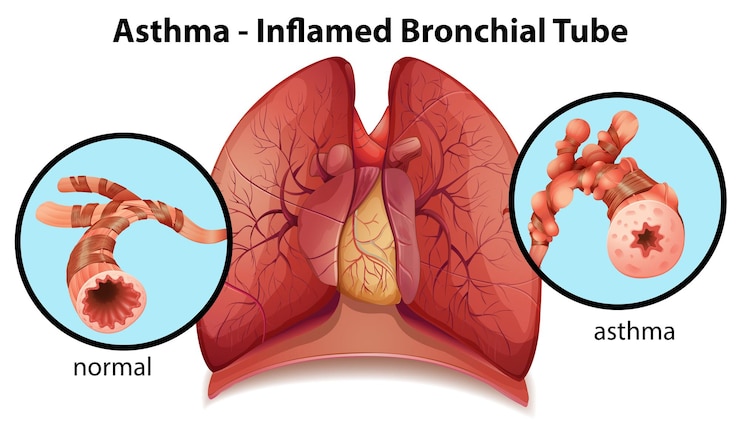
Asthma is additionally called Bronchial Asthma. A lung disorder characterized by narrowing of air ways, the tubes which carry air in to the lungs is constricted. There’s no treatment for asthma but can be managed through regular treatment. We’ve to identify the triggers and be far from it, we’ve to use inhalers properly.
Asthma can’t be cured, but its symptoms are often controlled. Because asthma often changes over time, it’s important that you simply work with your doctor to track your signs and symptoms and adjust your treatment as needed.
Our bronchial asthma treatment clinical centers in Manikonda, Khajaguda, Gachibowli, Nanakramguda, Narsingi, Hyderabad equipped with bronchial asthma treatment doctors, specialists who provide bronchial asthma treatment, asthma treatment, medicine for asthma treatment.
We also offer copd treatment in Khajaguda, Manikonda, Gachibowli, Nanakramguda, Narsingi, Hyderabad.
Asthma symptoms vary from person to person. You may have infrequent asthma attacks, have symptoms only at certain times — such as when exercising — or have symptoms all the time.
Asthma signs and symptoms include:
It isn't clear why some people get asthma and others don't, but it's probably thanks to a combination of environmental and inherited (genetic) factors.
Asthma triggers
Exposure to varied irritants and substances that trigger allergies (allergens) can trigger signs and symptoms of asthma. Asthma triggers are different from person to person and may include:
Prevention and long-term control are key to stopping asthma attacks before they begin. Treatment usually involves learning to acknowledge your triggers, taking steps to avoid triggers and tracking your breathing to form sure your medications are keeping symptoms under control. Just in case of an asthma flare-up, you'll need to use a quick-relief inhaler.
Doctor Krishnadaram clinic is the best malaria treatment, We have a highly experienced malaria treatment specialist who provides a comprehensive best clinic for malaria treatment in Khajaguda, Manikonda, Gachibowli, Nanakramguda, Narsingi, Hyderabad.
Our Popular Treatments
Doctors consultation for the covid care center coronavirus treatment | Type 1 & 2 Diabetes/sugar treatment | thyroid specialists doctor treatment | Hypothyroidism/hypertension specialist treatment | Obesity clinic for weight loss/overweight treatment | malaria doctor specialist treatment | dengue doctor specialist treatment | typhoid doctor specialist treatment | TB(tuberculosis ) doctor specialist treatment | diarrhoea doctor specialist treatment | UTI(urinary infection clinic treatment | Viral infection fever clinic treatment | Bronchial asthma specialist clinic treatment | COPD(Chronic obstructive pulmonary disease) specialist clinic treatment | Viral pneumonia specialist clinic treatment | Snoring\sleep apnea clinic treatment | Iron deficiency best clinic for anemia treatment | Gastric health care/elder care services | Pain management/pain relief specialist
Have a question? We are here to help. Send us a message or make a call, We’ll get back to you as early as possible.
Copyright © 2023 Dr.Krishnamurthy Daram. All rights reserved.